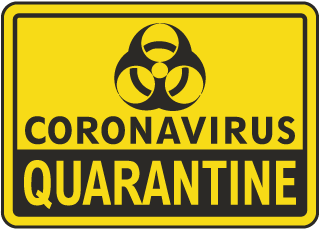Coronavirus quarantines are spreading. Fifty million people have been quarantined in China. Hong Kong has quarantined people from the Chinese mainland. A cruise ship remains quarantined in Japan. The U.S. banned entry for people traveling from China while slapping a 14-day quarantine on Americans returning from China.
The Chinese government has warned of fear-mongering. But a pandemic is a scary thing. Contagion conjures images of the Black Death and the zombie apocalypse. But quarantines are also frightening. Imagine desperate people pounding on the gates that lock them in with the disease.
Quarantines may not seem controversial, when viewed from the standpoint of public health. The goal is to prevent infected people from spreading the disease. To defend the majority, some people’s liberty is limited.
China, a country of 1.4 billion people, may not be overly concerned about violating the rights of 50 million. But it would be difficult to imagine this happening in the U.S. If the disease spreads here, would we be willing to restrict the liberty of 50 million Americans?
One concern is people in the quarantine zone who are not yet infected. A quarantine that puts healthy people at risk seems to violate the basic principle of medical ethics that demands that we “do no harm.”
Some may simply bite the utilitarian bullet and say that in the name of the greater good, some healthy people’s rights may be violated. But the healthy person may disagree. Would a healthy person in quarantine be wrong to try to escape? And if they got infected, would they have a right to sue for damages?
Quarantines are not as easy to justify as we might think. Bioethicist George Annas has argued that quarantine is an “arbitrarily draconian” measure and a “relic of the past that has outlived its usefulness.”
The practice has medieval roots. Centuries ago, plague prevention required 40 days of isolation. The name “quarantine” comes from the Italian word for forty. But why 40 days? Well, in the Bible, the number is connected to a mystical process of purification. It rained for 40 days and nights during Noah’s flood. Moses wandered for forty years in the desert. And Jesus fasted for 40 days.
We no longer believe in supernatural numerology. The proposed quarantine for coronavirus is based upon a 14-day incubation period. But scientific and political judgment can be influenced by cultural factors.
Consider the exotic source of recent pandemic threats: Ebola comes from Africa; coronavirus from China. Racial and cultural assumptions may make us think in terms of preventing “them” from infecting “us.” Quarantine can reinforce discrimination and prejudice.
A long-run solution to pandemic threats must work in the opposite direction. We ought to improve the sanitary conditions and general health of people in the developing world — and here at home. If people everywhere had access to adequate health care, the risk of contagion would be minimized. Quarantine is a short-term solution to a problem that is ultimately about global justice in health care.
A related consideration is science education. In the background is the anti-vaccination crowd. An outbreak of measles that killed at least 63 people last year in Samoa was blamed on anti-vax messaging. A prominent anti-vaxxer was arrested. In the U.S., the First Amendment would seem to prevent the arrest of those who dispute the science of public health. Nonetheless, science literacy and education about preventive health care are essential.
Finally, it is worth considering whether we have an obligation to give special care to those who are quarantined. It would be wrong to shut the gates and leave people in quarantine to suffer. In fact, since we are violating their liberty and putting them at risk for our benefit, we may even owe them special compensation.
Critical thinking about all of this is made more difficult by panicked responses. Unfortunately, these are reactionary times. Fear of contagion is exacerbated by zombie movies and rising animosity toward immigrants. Feverish overreaction must be moderated by common sense and careful consideration of medical ethics.
A quarantine is a morally problematic emergency last resort. We should work harder to prevent those emergencies in the first place. We ought to care for the sick. And we must address the long-term challenges of global public health.


